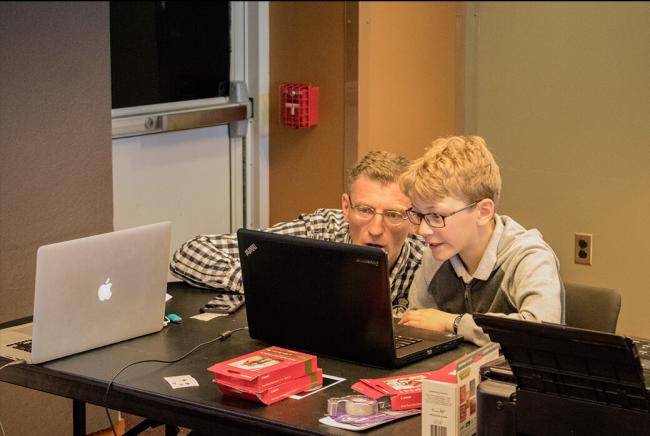STEM Education Research
Science isn’t merely for scientists. Understanding science is part of being a well-rounded and informed citizen. Science, technology, engineering, and mathematics (STEM) education research is dedicated to studying the nature of learning, the impact of different science teaching strategies, and the most effective ways to recruit and retain the next generation of scientists.
Our Work
Center for Astrophysics | Harvard & Smithsonian STEM education researchers are engaged in a number of projects:
Developing research-based tests for use in evaluating students’ knowledge of science concepts. These tests are designed to check for common differences in the way non-scientists understand a subject as compared to scientists. When offered at the beginning and end of science courses, they assess whether instruction has resulted in students' conceptual growth. The tests are freely available for education researchers and teachers, and cover the full range of elementary, secondary, and university courses in science.
Misconception-Orientation Standard-Based Assessment Resources for Teachers (MOSART)Studying ways to improve students’ preparation for introductory STEM courses in college. Students arrive at college with varying pre-college educational experiences, which often influence how well they do in their first STEM classes. To keep interested students in STEM programs, researchers look at measurable factors that predict improved performance.
Factors Influencing College Success in STEM (FICS)Discerning factors that strengthen students’ interest in pursuing a STEM career. Education researchers look at a whole range of pre-college experiences in and out of school that can affect students’ interest in pursuing STEM careers, in order to see both what encourages and what drives them away.
Persistence in STEM (PRiSE)Examining predictors of student outcomes in MOOCs. Many universities have implemented MOOCs to provide academic resources beyond the university, but the research on how well they perform compared with ordinary classes is scant. In addition, MOOCs are frequently plagued by students dropping out. By studying actual implementations of MOOCs, SED researchers hope to gather evidence to explain why many students don’t stick with the course through the end.
Massive Open Online Courses (MOOCs)
Advancing Science Teaching and Learning
Public understanding of science is essential for our democratic society. At the same time, white female students and students of color are underrepresented across STEM fields, which is a problem both from equity and workforce demand perspectives. For these reasons, researchers at the Center for Astrophysics | Harvard & Smithsonian study how to improve science teaching and learning.
The Science Education Department (SED) at the Center for Astrophysics is dedicated to researching how people learn, and identifying measurable ways to evaluate learning for students in STEM classes. SED researchers have developed assessment tools designed to evaluate students’ conceptual knowledge for all levels from elementary school through university. These tests are freely available for teachers and other education specialists. Experts in the program also study the educational outcomes of massive open online courses (MOOCs), which are widely used by universities despite the current lack of evidence on their effectiveness.
A current challenge of STEM education is the substantial underrepresentation of white female scientists and scientists of color across STEM fields, which limits the potential for innovation and excellence in scientific research. To address this problem, SED researchers study variables that predict persistence of students within the STEM pipeline, factors that impact achievement by students in STEM courses, and the development of science identity.
In addition to pursuing fundamental STEM education research, Harvard and Smithsonian educators translate these findings into practice by developing innovative science programs, curricula, interactive media, and technology-based tools for STEM learning. For example, we developed a college-level course about astrosociology—examining the multiple interconnections between humanity and the cosmos—which has been taught in the Harvard Astronomy Department since 2017 (ASTRON 5 Astrosociology) and has become highly popular among students. The course covers a wide variety of topics, from the ancient beginnings of astronomy to potential contact with aliens, and emphasizes student-centered pedagogy. This WHITE PAPER reports on an NSF-sponsored conference about broadening the astrosociology curriculum to include diverse cultural perspectives. These research-based resources are used by educational audiences in the United States and around the world. The significance of SED’s work has been recognized in the form of grants from the National Science Foundation, NASA, and the National Institutes of Health.

Cambridge Explores the Universe 2018, held at the Center for Astrophysics | Harvard & Smithsonian in Cambridge, MA.

A student working with a professional astronomer at the Cambridge Explores the Universe 2018, held at the Center for Astrophysics | Harvard & Smithsonian in Cambridge, MA.
Related News
Michael Foley Elected First Grad Student on AAS Education Committee
CfA Job Shadow Event Makes Astronomy More Accessible
To Navigate the Heavens, Take a Seat
Thousands of New Astronomical Images Highlighted in Latest Release of WorldWide Telescope
Astronomy Educators Awarded $2.8M to Inspire Minority Youth to Pursue STEM Careers
Projects
AstroAI
Factors Influencing College Success in STEM (FICS)
Massive Open Online Courses (MOOCs)
Misconception-Oriented Standards-based Assessment Resources for Teachers (MOSART)
Persistence in STEM (PRiSE)
Sensing the Dynamic Universe
SDU Website
WorldWide Telescope (WWT)
YouthAstroNet
Telescopes and Instruments
Hinode
Visit the Hinode/XRT Website
MicroObservatory Telescope Network
Visit the MicroObservatory Telescope Network Website
Spitzer Space Telescope
Visit the Spitzer Space Telescope IRAC Page